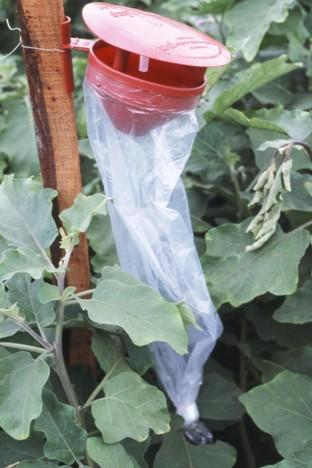Pheromone traps
Pheromone traps
Sex pheromones (Septa) are insect specific produced artificially in laboratories and used seperately.
Pest attracted
American boll worm, spotted boll worm, pink boll worm, dimond back moth, white grubs.
Materials required
- Rubber septa (Pheromone lures), traps and pouches
- Polythene bags/ sheets
- Small piece of wire for suspending the lures
- Knife for opening the bottom
- Insect brush and scissor

Methodology
Cut the polythene sheets into required size (2ft. length X 4 inch wide) and make polythene arm. Close the bottom end of the arm with rubber band to prevent the escaping of trapped insects and to flush out them. Wrap and fit the other end of polythene arm with wider end of the funnel with the help of rubber band/wire. Keep the lid of funnel one inch above mouth of the funnel. Make a small hole to place septa/ lure. Fix the trap containing lure in the field with the help of bamboo sticks keeping the lure nearly one foot above the crop canopy.
Field application
Lures containing sex pheromones are placed into insect trap and erected in the field at a recommended spacing. The lure will release the sex pheromone at a constant rate over a period of 2-4 weeks. Male moths are attracted and while attempting for mating, fall into a container having pesticide. Thus the female moths in the field are deprived of successful mates and fail to reproduce or lay viable eggs.
Caution while using pheromone traps
- Always label the trap with detailed information of the species to be trapped and the date of fixing the lure
- Change lure once in 15-20 days
- Dispose properly the lure wrappers/covers
- Wash hands before/after handling baits
- Remove all captured adults during each visit. Put live ones into a bucket with soap solution to drown
Source: Skill Development of Farmers for Production of IPM inputs in IPM Seva Kendra
Last Modified : 3/1/2020
This topic covers information about production of ...
This topic covers information about production of ...
This topic covers information about production of ...
This topic covers information about production of ...
